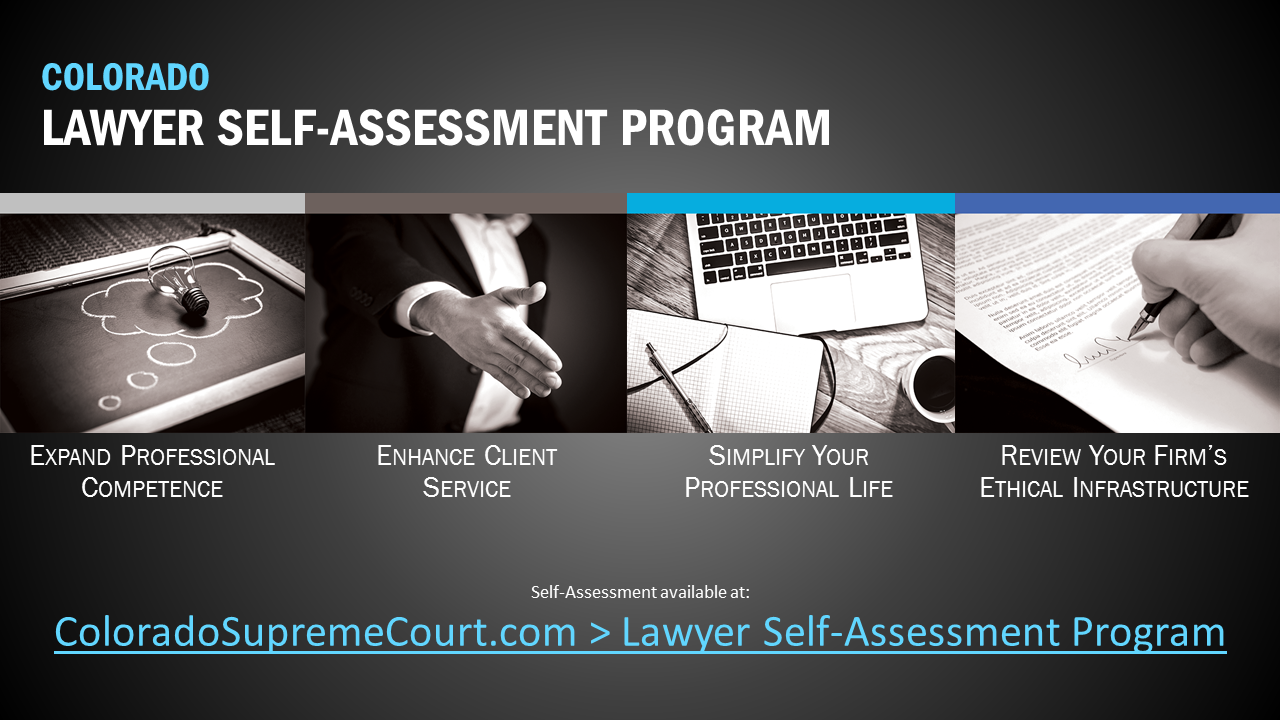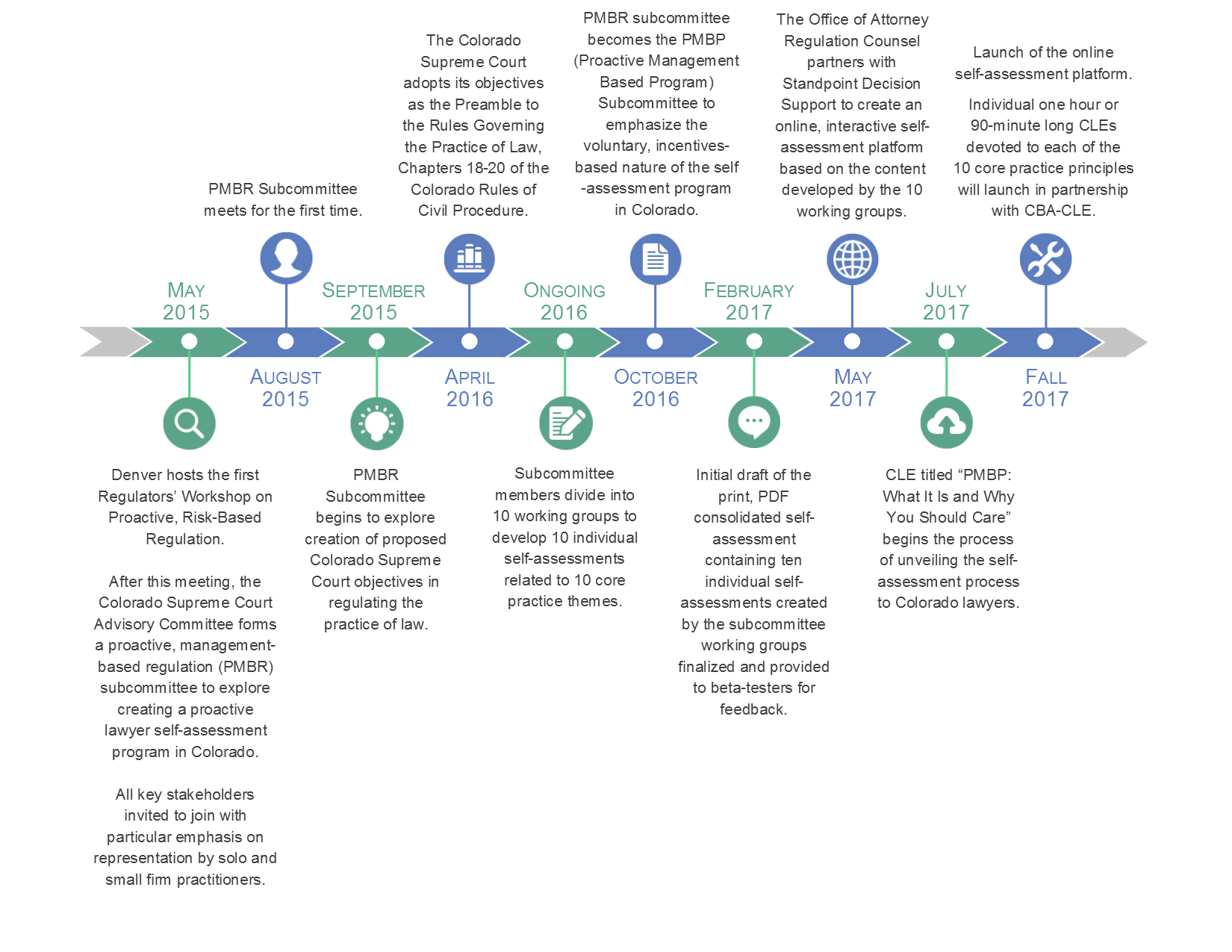A law practice check-up
The lawyer self-assessment tool is preventative care available to all
attorneys
By Zak Bratton and Jonathan White

The First of Its Kind
We are all familiar with annual physicals, the need for regular car maintenance, and for those out there who own a home or condo, doing HVAC check-ups, hot water heater flushes, or simply changing the air conditioning filter. These periodic maintenance activities keep our bodies, cars, homes in good working order. They help us detect and prevent problems that may sideline our health, safety, or comfort. The new lawyer self-assessment program created by a subcommittee of the Colorado Supreme Court Advisory Committee embeds the concept of a check-up, and its associated benefits, into the practice of law.
The idea here is simple: give Colorado lawyers a tool to evaluate their practice's performance when it comes to professional obligations as well as procedures that improve the quality of legal services offered to clients.
Traditionally, state and federal attorney regulation has been reactive. It investigates and, depending on the evidence, prosecutes and seeks formal discipline. Colorado leads the nation in attempting to change the conversation by encouraging lawyers to engage in voluntary, forward-thinking, confidential practice self-assessments. The goal is to reduce the need for professional discipline by preventing practice problems on the front-end.
The Colorado Supreme Court Advisory Committee formed the Proactive Management-Based Program (PMBP) subcommittee in the summer of 2015 to explore how to bring a proactive, incentives-based lawyer self-assessment program to the state. An online lawyer self-assessment survey launching this fall caps off the subcommittee’s multi-year efforts to create a proactive self-assessment program.
How It Works
Lawyers in Colorado can access the online lawyer self-assessment platform by going to the Office of Attorney Regulation Counsel's website, www.coloradosupremecourt.com. On the navigation bar on the right side of the screen is a tab where they can select the "Lawyer Self-Assessment Program." Clicking this tab takes lawyers to a page that explains the program and that contains a link to the online self-assessment platform. Selecting the online survey link directs lawyers to a survey platform hosted by Standpoint Decision Support. Standpoint Decision Support is a Vancouver-based survey platform design and data analytic company that the Office of Attorney Regulation Counsel partnered with to create the online survey.
Within the platform are ten discrete assessments. Each relates to a key principle of professionalism. These ten principles are:
1. Developing competent practices;
2. Communicating in an effective, timely, professional manner, and maintaining professional relations;
3. Ensuring that confidentiality requirements are met;
4. Avoiding conflicts of interest;
5. Maintaining appropriate file and records management systems;
6. Managing the law firm/legal entity and staff appropriately;
7. Charging appropriate fees and making appropriate disbursements;
8. Ensuring that reliable trust account practices are in use;
9. Working to improve the administration of justice and access to legal services;
10. Wellness and inclusivity.
Each one of these ten self-assessments features questions lawyers can use to evaluate their practice proactively. Lawyers can choose to take only specific sections of the survey but they are encouraged to complete the whole survey for holistic practice evaluation as well as for CLE credit.
The survey process does not end with answering "yes" or "no" to a series of practice-related questions. It also features links to the Colorado Rules of Professional Conduct so that lawyers can review the rules and understand the tie-in to the practice points raised. Additionally, the platform offers links to outside educational resources ranging from formal ethics opinions of the Colorado Bar Association’s Ethics Committee, to opinions authored by the American Bar Association’s Standing Committee on Ethics and Professional Responsibility, to law journal articles, as well as template forms and letters published by bar associations or professional liability carriers.
As lawyers work through the self-assessment, a progress bar on the bottom of the screen tracks their progress. It shows a percent completion of each category. Once a lawyer completes the self-assessment, he or she can print or download a report showing answers and offering links to educational resources. Additionally, so long as a lawyer completes all ten sections, he or she can claim CLE credit for taking the survey.
The survey is confidential. The Office of Attorney Regulation Counsel has no access to Standpoint Decision Support's website or a lawyer's individual answers. Nor is Standpoint Decision Support collecting individual answers other than to transmit them back to a lawyer who takes the survey through an end-of-survey report.
Standpoint Decision Support will collect aggregate, anonymous data such as usage rates, links to educational resources or rules that are most utilized, frequently-accessed sections, and anonymous feedback from users as to what was helpful and what could be improved. This will help the subcommittee refine the survey platform and understand what educational programs might be helpful to the legal community.
The online platform is not the only way lawyers can complete the assessment. Lawyers can also go to the same coloradosupremecourt.com website and find a link to a downloadable, printable PDF survey that they can use in lieu of the online survey. That PDF document similarly contains links to the Colorado Rules of Professional Conduct and a variety of educational materials.
The Evolution of the Proactive Practice Concept
As mentioned, Colorado leads the nation in unrolling a voluntary, incentives-based self-assessment program. Denver hosted the first international Regulators' Workshop on Proactive, Risk-Based Regulation in May 2015. The Office of Attorney Regulation Counsel co-sponsored this workshop along with the American Bar Association's Center for Professional Responsibility and the Maurice Deane School of Law at Hofstra University. Participants came to Denver from not only across the United States, but also Canada and Australia.
The group discussed how to promote the proactive practice concept from a regulatory perspective. Compelling data out of Australia showing that proactive self-assessment programs reduced client complaints proved instrumental in this discussion, as did the significant scholarly work on the topic and its benefits. Several professors have pioneered the concept of proactive practice assessments. They include Professor Susan Fortney of Texas A&M School of Law, Professor Ted Schneyer of the Rogers College of Law at the University of Arizona, and Laurel Terry of the Penn State Dickinson School of Law.
Colorado responded to this flurry of activity in Denver in May 2015 through the formation of the PMBP subcommittee, chaired by David Stark. Stark is a partner at Faegre Baker Daniels in Denver and chair of the Attorney Regulation Advisory Committee of the Colorado Supreme Court. In chairing the PMBP subcommittee, Stark explains he has a significant interest in helping lawyers develop what Professor Schneyer has termed an "ethical infrastructure." Stark says this ethical infrastructure is what "keeps lawyers out of trouble when it comes to grievances, malpractice complaints, or unhappy clients. Ethical infrastructures gives lawyers a way to manage and reduce risks."
To create the
self-assessments and help lawyers with their ethical infrastructure, the
subcommittee recruited lawyers from a variety of practice backgrounds. These
volunteers devoted considerable time into looking at what practices and
procedures are critical to furthering individual competence, client service,
and maintaining compliance with professional obligations. All told, over fifty
lawyers participated in the development of the self-assessment program. The
extensive survey reflects the many years of experience these lawyers brought to
the table in helping identify essential elements of ethical, client-oriented
practices.
Peer Review, Mentoring, and Education
The online platform launching this October reflects the current state of subcommittee’s work. However, it remains an evolving work-in-progress which will change as feedback from our legal community is received. The subcommittee plans to explore creating a peer review component of the self-assessment process. Subcommittee members believe lawyers should have the opportunity to discuss practice issues identified through the survey with another lawyer.
Mentoring and professional development are pillars of this program. Denver attorney David H. Wollins, a member of the subcommittee who helped design the self-assessment on the topic of competent practices, explains "This program is about self-evaluation and using self-evaluation as a part of professional development." He also observes that mentoring is interwoven into the very fabric of the platform. As he puts it, these self-assessments are "tools created by lawyers for lawyers to help lawyers enhance competence."
Stark says he wants lawyers to think of this program as an educational opportunity. "There are many resources here for lawyers to access to learn more about a certain practice procedure. The resources give context. They explain why that particular practice procedure makes sense from either a professional conduct perspective, a client service perspective, or both."
Meanwhile, the platform itself is a community resource. It has benefited from the input of the many members of the subcommittee and their collective experience. It can grow, change, and adapt depending on the needs of the legal community. For example, if Colorado lawyers identify new educational resources that correspond to topics in the survey, those can be added. More practice-specific checklists and materials will benefit lawyers in certain fields and make the assessment process even more useful to them. As the online platform launches, the subcommittee already looks forward to building the platform and expanding the resources offered through it.
Making Practice a Little Bit Easier and Earning CLE Credit at the Same Time
The PMBP subcommittee recognizes that not every self-assessment question applies to every law practice. However, collectively, the questions should help lawyers from a variety of professional backgrounds think about how to deliver better service, improve their practice efficiency, and ultimately build a happy client base that leads to referrals. The subcommittee wants to see the program open the gate to greater career satisfaction among lawyers.
Barbara Ezyk, Director of the Colorado Lawyer Assistance Program and a member of the PMBP subcommittee who helped design a self-assessment related to lawyer well-being, says that one of the benefits of the program is that looking to proactively prevent problems leads to less practice uncertainty. It should also lead to fewer time-consuming, anxiety-riddled crises.
According to Ezyk: "Lawyers need a way to reduce stress. They need to make their professional lives a little less hectic. These self-assessments are one way to do that. Knowing you're on the right track in running your practice and knowing that you’re taking care of yourself in the process can bring some beneficial peace of mind. Bottom line: if you do not put your own well-being first, you will not be an effective advocate for your clients."
The self-assessments are an investment of time in helping to bring about that greater peace of mind Ezyk describes. In order to encourage lawyers to engage with the questions and resources identified, lawyers who complete all ten assessments can submit an online affidavit and claim up to three ethics credits.
Further,
recognizing that the surveys can evolve and change to meet the community's
needs, lawyers may also submit anonymous comments through the online platform
to help the subcommittee improve the content of the self-assessments.
Ultimately, as 2017 draws to a close, consider the self-assessment program akin
to those other check-ups you do periodically. Set time aside to review the
material created by the subcommittee. Do a law practice check-up.
Zak Bratton is the Education and Outreach Coordinator for the Office of Attorney Regulation Counsel. Jonathan White is a Staff Attorney with the Office of Attorney Regulation Counsel.
